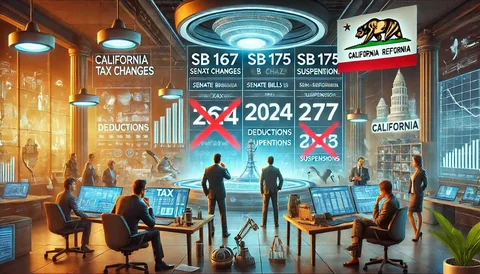
Senate Bills 167 and 175, recently enacted in California, introduce several significant changes that affect startups and other businesses in the state, primarily targeting tax regulations and incentives. The overall effect will limit startups’ ability to deduct losses and use tax credits for the next three years in the state of California.
Taxes are likely to increase for startups that are earning more than $1 million in income. In addition, technology startups that do extensive development face limits on using Research and Development (R&D) tax credits. This new legislation will be implemented for tax year 2024, so will affect tax filings starting in calendar year 2025. The new rules affect the entire 2024 taxable year, so some startups may already have transactions that will fall under these rules.
Unfortunately, this will compound with the Federal laws that increase taxes on startups conducting research, since the Tax Cuts and Jobs Act (TCJA) no longer allows companies to expense R&D costs but instead forces them to capitalize and amortize them over multiple years. Our data shows that 5% of unprofitable startups were pushed into a tax income positive position from the TCJA, and this new California legislation will likely impose additional taxes on many of the same startups.
What Are The Key Provisions of SB 167 and SB 175?
Suspension of Net Operating Loss (NOL) Deductions
SB 167 suspends the ability for businesses to use California Net Operating Losses (NOL) deductions for tax years beginning January 1, 2024, through January 1, 2027. This suspension applies to businesses with more than $1 million in income. NOLs typically allow businesses to offset taxable income with past losses, reducing tax liability. During the suspension, the carryforward periods for NOLs are extended: three years for losses before January 1, 2024, two years for losses between January 1, 2024, and January 1, 2025, and one year for losses between January 1, 2025, and January 1, 2026. The normal carryforward period is 20 years without additional extensions.
Limitation on Business Tax Credits
Both bills limit the use of business incentive tax credits. Specifically, starting in 2024, businesses can only use these credits to offset up to $5 million in tax liability annually. This limitation affects credits such as the Research and Development (R&D) tax credit but excludes credits like the Low-Income Housing tax credit and the Pass-Through Entity Elective tax credit (which apply more to individual taxpayers rather than corporations). .
Refundable Credit Election
SB 175 allows businesses to elect to receive a refundable credit of up to 20% of qualified credits during the three-year limitation period. This can help businesses get some benefits from their credits even with the overall limitation.
Impact on Startups
For startups, these changes can have several implications:
- Cash flow challenges. The suspension of NOL deductions means startups that typically operate at a loss but might have occasional high-revenue years will face higher tax bills without the ability to offset with previous losses. This can strain cash flow, especially during any high-growth phases.
- Reduced benefit from tax credits. Startups often rely on tax credits like the R&D credit to reduce their tax liability. The $5 million cap on using these credits means that high-expense R&D startups, like those in software or biotechnology, might not be able to fully use their credits.
Strategic Planning Is Required
Overall, these legislative changes are an attempt to address California’s budget shortfalls but will likely impose additional tax burdens on startups. Note that this applies only to the California portion of state-apportioned taxable income, rather than federal taxable income. Startups in California may need strategic tax planning to manage the timing of income recognition and the utilization of credits and deductions effectively under the new rules to reduce the impact of these changes. Contact Kruze Consulting to evaluate how these new rules will affect your startup’s taxes, and create a plan to manage your tax burden.








